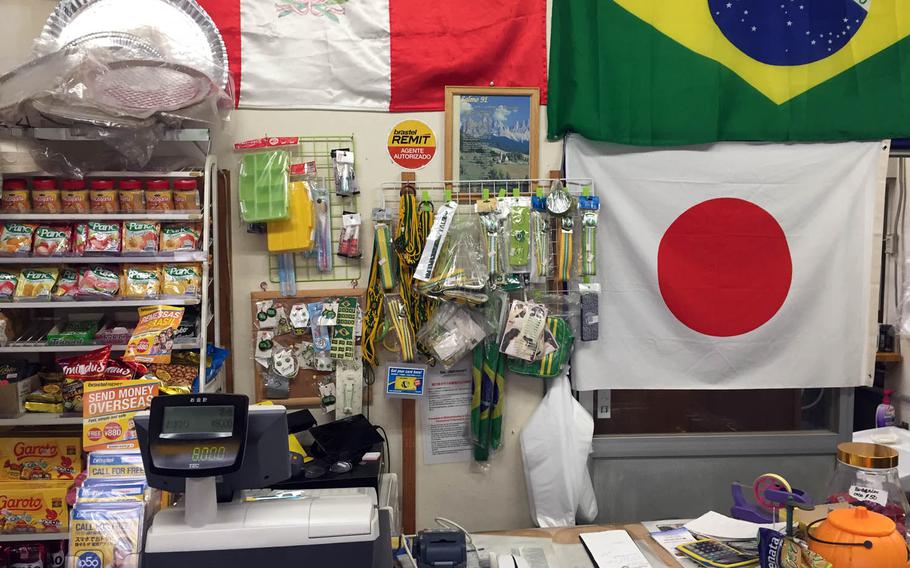
The interior of Paraiso Brasil displays both Japanese and Brazilian flags and memorabilia. (Tyler Hlavac/Stars and Stripes)
In Japan, “Brazilian” might not mean what you think.
Early in the 20th century, hundreds of thousands of Japanese sought fortunes in Brazil, and many of their children and grandchildren still live there. Today, the nation boasts the largest Japanese expatriate population, with many based in Sao Paulo.
By the 1980s, Brazil’s stagnation and Japan’s bubble economy were drawing migrants back across the Pacific to take up jobs in manufacturing. But integration wasn’t easy for people with limited language skills. They struggled for acceptance, and immigrants with mixed Japanese-Brazilian blood had an even tougher time.
Many Japanese still refer to Japanese-Brazilians as simply “Brazilians.”
Paraiso Brasil, a lunch counter and market in one of Yokohama’s blue-collar backstreets, offers a glimpse into Japan’s Brazilian-immigrant community.
It’s not the easiest place to find. Tsurumi, which straddles the northern border between Yokohama and Kawasaki, is one of many Yokohama neighborhoods along the coast that are home to immigrants such as Japanese-Brazilians and Zainichi-Koreans working in nearby industrial areas.
Brazilian influence is evident at Tsurumi Station, where city signs and banners are printed in Japanese and Portuguese.
Paraiso Brasil, which includes a small market selling Brazilian snacks and goods, is also a cultural mashup with staff and customers from both cultures.
Japanese and Brazilian flags fly above the counter, and Brazilian television plays as customers browse a menu of Brazilian dishes written in Japanese and Portuguese. Both languages emanate from the kitchen.
The menu is rooted firmly in traditional Brazilian working-class fare. Stews, sandwiches and grilled meat dishes are available. Stewed or grilled meat, beans and vegetables are the staples of most dishes, which cost roughly 1,000 yen (about $9.20). Many of the dishes are also made with farofa, a toasted cassava flour mixture. Cassava itself is a shrub native to South America that is somewhat similar to yucca and is the third-most popular carb after rice and maize.
A good example of the use of cassava is vaca atolada (1,560 yen, or about $14.30, for a meal set), another dish served at Paraiso that is a meat and cassava stew, with the cassava root cooked until it turns to paste.
I tried the feijoada stew, which cost 1,200 yen (about $11). Many consider this to be Brazil’s national dish, and it’s made with black beans and pork trimmings to include ears, tails and trotters. I’m not familiar with Brazilian food, so it’s hard for me to make an accurate judgment. It tasted thick and salty. I’m not sure I would recommend eating it twice, but at least one taste in the interest of trying something new is warranted.
Paraiso Brasil might be just a lunch counter for local workers, but its unique fare makes it worth a visit for those looking to catch a glimpse of one of Japan’s immigrant communities.
Paraiso Brasil
Location: 3 Chome-26-4 Sakaechodori, Tsurumi Ward, Yokohama, Kanagawa Prefecture.
A 15-minute walk from Tsurumi and Keikyu-Tsurumi stations.
Hours: Noon to 10 p.m., Monday and Tuesday; 10 a.m. to 10 p.m., Wednesday through Sunday
Prices: Most dishes range from 1,000 to 2,000 yen.
Dress: Casual
Menu: Japanese and Portuguese only.
Information: 045-503-6466